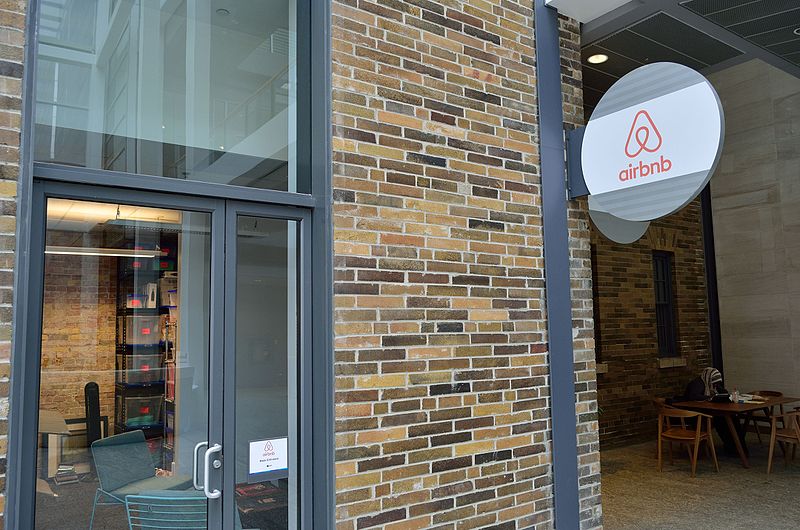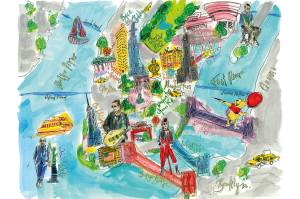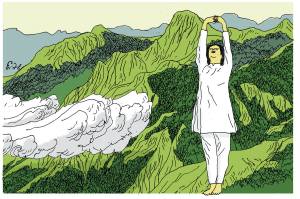Airbnb is in trouble. Nick Gerli, CEO of real estate consulting firm Reventure, reports, “The Airbnb crash is real,” along with a list of the top ten cities where the company’s revenue has collapsed. “Watch out for a wave of forced selling from Airbnb owners later this year,” Gerli forbodes.
Last month the Wall Street Journal reported, “Airbnb reported higher revenue and profit in the first quarter, but customers reserved fewer-than-expected stays and the company gave a mixed outlook for the second quarter, spooking investors.” And while Investors Business Daily this week forecast “a new, more promising comeback attempt” for Airbnb stock, murmurings of an “Airbnbust” are hard to ignore.
According to Gerli, the cause of the crash is that “the pandemic is over. Fewer people are working from home/vacationing in states like Montana, Texas and Tennessee. So the demand is way down. Just as the Airbnb supply went way up.”
Prior to the online property rental company’s “woke” left turn, I habitually rented Airbnb properties while traveling. With the exception of the host who left instructions that my friends and I “vacuum the oven” before check-out, my experiences were all straightforward and satisfactory. Some are extra memorable, too, as I was fond of seeking out oddball listings that offered unique experiences.
There was the “tucked-away tipi” in the Pennsylvania Wilds. Sure, it took three days for my brother and me to see clearly from bloodshot eyes induced by the fire ring we made use of in the middle of the tent, but holy authentic, Batman! There was also the “romantic bus in the forest” outside Asheville, North Carolina, where I shivered through the night and embraced by inner hippie by learning to use a composting toilet. In Ketchum, Idaho, a gal pal and I slept like hibernating squirrels in someone’s backyard “treehouse.” On another occasion a yurt became my overnight home, and many other times, it was a cozy cabin or cottage.
Though I’ve enjoyed my unorthodox lodgings, they’re not for everyone, and certainly not for the every day. As Gerli’s Twitter post gains steam, users have been chiming in with their own Airbnb experiences, good and bad. According to some, Airbnb is about offering amenities, such as space for a family of ten and a full-sized kitchen, and experiences — such as suffocating, period-correct campfire smoke (privilege checked) — that are not available at a run-of-the-mill hotel.
But then there are the Airbnb “horror stories” that garner clicks all over the internet (Buzzfeed, Reddit, Fodor’s, Country Living, Mashable and VICE have all curated their own) and scare off potential users and hosts. There are also complaints that the point of Airbnb rentals is that they’re supposed to be cheaper than a hotel, and when cleaning fees and the “Airbnb service fee” are factored in (not to mention some outrageous rules), these rentals end up being as costly as a standard hotel, if not more so.
A friend alerted me to the rumored downfall of Airbnb with a meme showing “the virgin Airbnb stayer” vs “the Chad hotel hedonist.” The Airbnb-er is described as “tried to save $100 while on vacation, loses his key, needs to find a locksmith, 1,000 emails saying he closed the door too loud at 10:01 p.m., probably in fifteen different spycam porn videos, aimlessly ambles around town using Google maps for food recs, finishes every trip by doing dishes and vacuuming, still gets fined $200 for leaving the place ‘messy.’” The Chad, by contrast, is described this way: “‘I’m on vacation, I’ll treat myself.’ ‘Hey I lost my room key,’ gets a new one in seconds. Returns to hotel at 1 a.m. drunk as shit, thinks nothing of it. Gets food recs from the concierge. Attended to by actual staff instead of a Ring doorbell that spies on him. Tries not to leave a mess, but doesn’t worry about missing a spot. The only hidden fee is how expensive the mini bar is.”
The meme has a point — and though I appreciate and support the concept of Airbnb, to succeed, the company needs to return to the “sharing economy” principles that caused John Stossel to cheer the inception of Uber, Airbnb and “collaborative consumption” in general.
Twitter user @euphorixa predicted Airbnb’s downfall back in 2021. “Airbnb got too much dip on they chip. They’re about to fall off,” she wrote. “No one is gonna continue to pay $500 to stay in an apartment for two days when they can pay $300 for a hotel stay that has a pool, room service, free breakfast & cleaning everyday. Like get real lol”
Yes, Airbnb, you do indeed have too much dip for your chip.





















